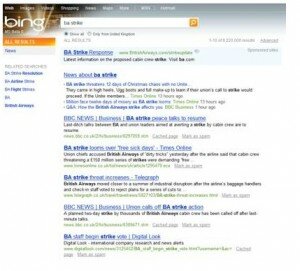by , senior PR and marketing manager, IAB
Following on from Henry’s blog post about Moira and Pam (which I swear to God is true, a friend of a friend who works at the BBC told me) we’re all about the #searchandsocialmedia at the moment. It’s becoming increasingly apparent when brands don’t have any control over (or knowledge of) what people are saying about them online, because it has an inevitable impact on their profile within the search listings.
In fact, in acknowledgment of this occasional short-sightedness, some brands can be quite quick to hop into their competitors search results pages. I feel bad for kicking them when they’re down, but Nestle have fallen victim to this with Greenpeace buying their name on Google (not Bing though, keep up guys!) because it’s a hot social media topic and search volumes have inevitably risen. Their PPC has the search result headline ‘Take a Break’ with the description “Which chocolate company destroys rainforests for palm oil?”
Whether you’re a fan of these tactics or not, they’ve acted quickly and understand that both search and social media are essential touchpoints for consumers and need to be considered together to make the most impact.
In fact in many ways, the first page of search results is more important than the home page of your corporate website. BA recognised this when they bought the term ‘BA Strike’ to greet searching consumers with their official response to the events over Christmas. This was a move informed not only by the extensive coverage on traditional channels such as TV and press, but also the amplified negative buzz around their brand due to extensive mentions on various social media properties.
People assume that during a PR crisis or when negative commentary arises all hell needs to break loose, but that doesn’t have to be the case. If you have a solid search and social media strategy in place, then you should be equipped to act and take steps to safeguard your online reputation when it all ‘kicks off’, and hopefully lessen the negative impact.
This is one of the reasons why we wrote a report with Microsoft Advertising entitled ‘Search and Social Media: making your brand stand out’, which gives guidance on the ways in which you can manage an online PR crisis using the two disciplines in tandem. Download your free copy here, and if you fancy winning an XBOX 360 you’ve got until Friday to tell us how many digital symbols you can find hidden in the front cover. (No one’s found them all yet so you’re still in with a chance of winning!)
In the report we highlight the need to act swiftly with proactive messaging based on what people are talking about online. But it’s not all about crises. There are number of other ways in which you can tap into the strong combination of search and social media even without the shit hitting the fan (sorry about that but I was running out of ways to say ‘crisis’.) And reacting to conversation online (whether positive or negative) could be a quick win for your brand. One of the best ways you can do this is through simple research, and using search behaviour and social media discoveries inform your strategy and content creation moving forward.
Our marketer survey from earlier this year told us that around 60% of UK brands are using social media for research purposes. But what kind of research is it? My guess is that it’s brand or product related, maybe even insights about direct competitors, but how great would it be to ethically work your way into what consumers are saying right now, with relevant content and intriguing conversation?
In January 2010 for example, according to Hitwise ‘Cheryl Cole’s lips’ was one of the top 10 fast moving search terms in the UK, in fact it was number 1. At the same time it was a trending topic on Twitter, during those few days when Chezza was photographed with what looked like awfully bee stung lips. Of course I’m not suggesting that you just buy the term if it’s totally irrelevant to your brand, complete with a totally irrelevant landing page, selling totally irrelevant products. However one of the best pieces of advice I’ve picked up over the years is to research about what people are talking about online, and then create bespoke content so that you’re actually giving consumers what they’re interested in, rather than creating a whole new topic of conversation and trying to get your audiences thinking the way you want them to.
There are a number of brands who could have capitalised on ‘Cheryl Cole’s lips’ (that sounded weird, didn’t it?) – of course cosmetics and toiletries immediately spring to mind. But literally every second of every day conversations are taking place that you can tap into (whether it’s your brand that’s being discussed or not) just by doing some research and adding something relevant to the search experience.
(And by the way, in case you’re interested, I’ve included a very crude mock up of how this could work, in the Search and Social Media report, you can download your copy here)


